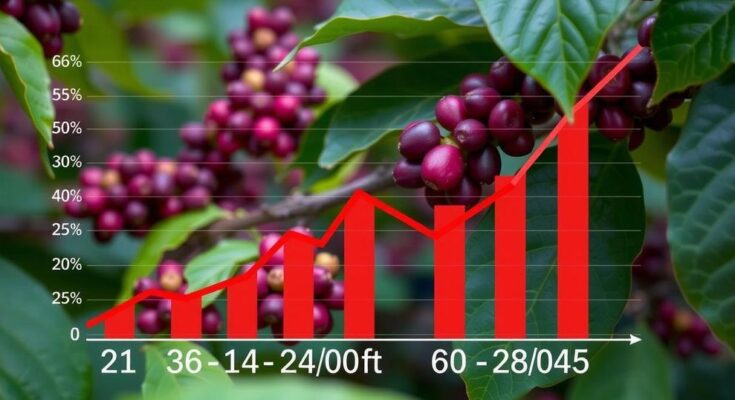Coffee prices are set to rise due to climate change effects, notably a recent 70% increase in arabica beans following severe droughts in Brazil. With arabica beans constituting 60% of coffee production and consistent global demand, these price hikes are expected to impact consumers significantly. Additional agricultural sectors face similar climate-related issues, emphasizing a broader crisis affecting various food products.
The cost of coffee is projected to rise, influenced predominantly by the adverse effects of climate change. Recent reports indicate that the price of arabica beans has surged to $3.50 per pound, marking a significant 70% increase compared to the previous year. This escalation is the most notable since the devastating frost of 1977 that obliterated over a billion coffee trees. The drought in Brazil, the leading global coffee exporter, has severely impacted coffee production and consequently, consumer prices.
Professor David Ortega of Michigan State University highlighted that droughts in key coffee-producing regions, such as Brazil, have created significant production challenges. Brazil recently experienced its worst drought in over 70 years, resulting in a substantial reduction in coffee supplies. Given that arabica beans constitute approximately 60% of global coffee production, such price increases are likely to resonate throughout the coffee market. Notably, other coffee varieties, including robusta beans, are facing similar climatic adversities, further compounding the problem.
As consumers contend with persistently high grocery prices, forecasts about the stabilization of coffee prices appear increasingly optimistic in light of ongoing climatic changes and market dynamics. The ramifications of climate change extend beyond coffee, affecting other agricultural products. For instance, hops are predicted to undergo flavor profile alterations and face cultivation difficulties, while the wine industry grapples with climate-induced variations that jeopardize specific grape varieties.
The persistent struggles to maintain coffee production amidst soaring global demand underpin the anticipated rise in prices. In Brazil, an estimated area equivalent to half the size of the United States is experiencing water stress, which contributed to a shortfall of millions of coffee bags in 2024. Projections suggest that production deficits may persist into 2025 and 2026, marking the fifth consecutive year of reduced output.
The topic of coffee prices is intricately linked to global climate change, which is affecting key agricultural regions critical for coffee production. As extreme weather patterns intensify, the ability to cultivate coffee sustainably becomes increasingly challenging. The recent droughts, particularly in Brazil, underscore the vulnerability of coffee crops and their sensitivity to climatic shifts. These conditions not only threaten the availability of coffee but also contribute to rising costs that significantly impact consumers worldwide. A thorough understanding of these dynamics is essential to comprehend the broader implications for both coffee lovers and the agricultural sector.
In conclusion, the price of coffee is poised for further increases, chiefly due to the severe impact of climate change on crop production. As arabica bean prices hit historic highs, consumers may soon face even higher costs amidst ongoing drought challenges in Brazil and other coffee-growing regions. These developments highlight the urgent need for sustainable agricultural practices to mitigate the effects of climate change on vital crops, including coffee, hops, and wine grapes.
Original Source: www.thedailymeal.com




